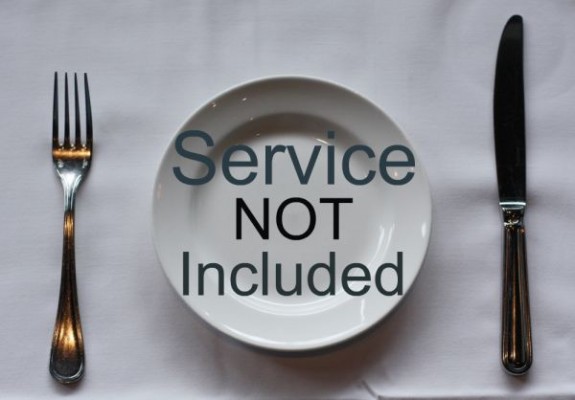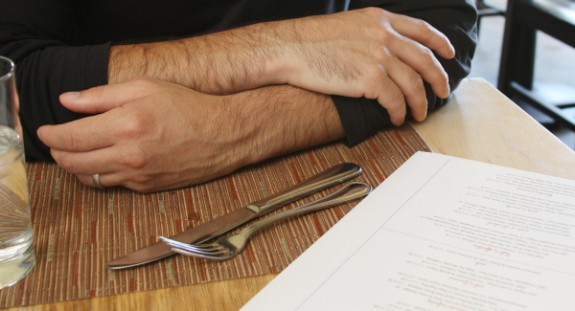One thing is for sure, if you’ve ever paid a restaurant tab you have are more than likely to have a strong opinion about tipping. Maybe you always tip 20% of the total bill. Maybe you think a 15% tip is sign enough that you’ve gotten good service. Or maybe you consider tipping a kind of frosting on the cake. Poll a random group of diners on their thoughts about tipping and within seconds you’ll feel the temperature rise as ardent responses come hurling back at you. No matter what you think about tipping, just about everyone has an opinion about what constitutes a good or bad tip.
I’m always amazed at how downright heated discussions become when the topics of service, tipping, and restaurant policies are brought up. People who have never worked in the restaurant business, lifetime servers, part time waiters, and frequent diners all seem to have strong views on the subject. For someone like myself–a restaurant professional who has worked in the industry for decades–I definitely come at this subject from an insider’s point of view. Not only do I write about service, I also read quite a bit about the subject. What surprises me the most is the ardent online chatter (nay, SCREAMING) about restaurant service.
Recently, CNN’s new food blog, Eatocracy, polled their readers on their view on tipping. Practically overnight, 45,000 opinionated readers responded with votes and lengthy ALL-CAP rants discussing exactly why they thought it was right or downright wrong to leave no tip if bad service is rendered by the waiter.
49% of voters said they left servers no tip after receiving bad service
29% left a low tip for bad service
15% said they would never leave nothing, and would never leave anything less than 15%
5% said they left a penny, just to prove a point
Based on these statistics, it’s easy to see that the average diner perceives service as a key element and required job skill for a server. While many diners are aware that their servers receive minimum wage salaries (according to the Department of Labor’s website, some states restaurant minimum wage can be as low as $2.13 or $1.45/hour), many still believe that a server’s job is to give good service, regardless of whether or not they receive a tip.
Tipping is not optional
Though I do agree that good service is part of the job description of restaurant employees, the part that many Americans don’t want to understand is that tipping isn’t optional. For better or for worse, at the current time in the United States, service is not included in your check, it is assumed by the restaurant–and ultimately the Department of Labor–that the diner will leave a tip on 12% to 15% of the total bill for their server. The problem is, many diners fail to understand that the livelihood of the service staff is in their hands.
Though the diner is free to tip what they think is reasonable, the understanding is –especially within the restaurant business–is that a “reasonable” tip should be in the rage of 12-15% of the total check. Anything above that is to be decided by the diner. Many people balk at paying up on the inherent fees of a waiter because they perceive that they can leave “anything they want.”
Giving service is the waiters’ job. Tipping is the implied job of the diner.
As flawed as the system is, waiters are one of the rare service professions that hands over complete control to the customer and allows the consumer to decide just how much their service fee should be. Restaurant service workers are part of a highly-trained professional league that are put in the unenviable position of earning their living through the accumulation of minimum wage dollars and tips from strangers.
A bank teller, a firefighter, and a shoe salesman might not hold a job you would consider enviable or highly difficult (they all require a certain level of expertise and great service), but the cost to the consumer is hidden within every transaction made with the customer. In Europe, a waiter’s tip is represented by a service fee that’s automatically added to the check (and is also reflected in higher costs for menu items). Though there are some restaurants that automatically add service fees to checks (Think Thomas Keller at Per Se), most restaurants give the diner the freedom to tip what they think is fair. Unfortunately, that leaves a lot of room for creative calculating on the part of the diner.
When you dine out, you enter into a kind of agreement that when you sit down at a table or take a seat at the bar, you will pay a supplemental service fee on top of the food and beverage costs, for services rendered. The service professional cleans up after you, delivers food, fights battles for you behind the scenes, and does their best to create the best dining experience possible. And yet, many diners dismiss the work that service professionals do and cite the fact that a tip isn’t necessary for such “mindless” or “menial” work.
“Why don’t you get a real job,” they say. But the thing is, working in restaurants IS a real job. Prejudice, it seems, is often reflected in the tip.
Waiting tables is an honorable profession and should be treated with a certain level of respect. If you can’t afford to tip, you can’t afford to eat out. We are not living in Europe folks. Tipping isn’t an option. It’s part of the diners’ agreement.



Such a great post. People don’t realize how little servers make when tips aren’t factored in. Also, people really don’t realize how difficult being a server can be. Just doing the job is hard enough, but giving good service is an art on top of that. Way to educate the public!
Loving this post! So glad you are doing this. So needed. xx
What a great post. I used to wait tables and although I loved it and was good at it, I was often baffled by the people who would receive stellar service but then not leave a tip or leave something minimal. It is very disheartening sometimes!
“If you can’t afford to tip, you can’t afford to eat out.” – so so true and people should really think about that before going out to dinner and spending lots of money on the food and then neglecting to leave a tip!! I have such a problem when I go out to eat in groups and my fellow eaters don’t want to leave a 18% + tip and it drives me nuts!!
You are such a service guru – it just rocks my world!
My kids and I just went to dinner tonight at Sauce on Hampton (in Venice, CA), where, with the check, diners get a card explaining why the restaurant automatically includes a 15% service charge with the bill. I like their reasoning: It lets the staff work as a team and ensures that everyone is fairly and equally compensated for providing diners with an excellent experience.
Sauce makes it clear that they do not expect diners to leave anything additional, but I always do – a few dollars, just so the servers know that we really appreciated their efforts. This is how we’ve always handled tipping in European “service compris” restaurants, too. Is this what the staff expects? Or are we overdoing it? Interested in the opinions of those here.
You tell ’em lady. I am seriously baffled that there’s still a discussion going on out there about whether or not to tip. I think you hint at the underlying problem here, which is that for some reason the population assumes that customer service is the domain of the uneducated or the lazy, as opposed to the intelligent creative people it is. Service is noble. And unless these people want to argue for a service charge, they need to pony up and tip.
Brooke, I so enjoy your honesty & integrity. Yes, tipping our servers is part of the deal when we dine out——always. The 5% that leave a “penny to leave a point.” What kind of point is that? That is a disgruntled act based out of anger and unkindness. Thanks for bringing this issue to our attention. xo
I admire your courage, sheer bravery to approach this subject of SLAVE LABOR… perhaps I add a tinsel of dramatic, but I really don’t think so. Here in Massachusetts, the “Labor Department” (huh?) pays waiters (drum roll—) $2.63 an hour! O and that’s a flat rate—no overtime on the Fourth, New Years, or any holiday for that matter. I think all the waiters and bartenders should migrate to Montreaux, underground railroad style.
Enlightening post. We’ve always used the 15% rule of thumb, but it’s always up for debate whether that’s 15% on the “total bill” or the “total bill before tax”. Where do people fall on that one? Also, is 15% a reasonable tip for bad service? What do you tip (or at all) for really horrible food and/or treatment by the waitstaff/management? (And, yes, not all food service “professionals” have the patrons’ interests in mind or are hard-working honest folk, though most are.)
Perhaps it is those w/o any experience in serving/bartending that don’t get it…completely agree that tipping isn’t optional. If service is really bad enough to feel a tip isn’t worthy (or the I’m-gonna-make-a-statement penny) I think a conversation with the manager is worth a few minutes time.
@Jeremy, Great question. The point I was looking to make about the “total bill” was about including all items. Some diners like to omit liquor or wine purchases from their bill and then tip on that new total. I’ve never understood that practice and was trying to quietly imply that tipping is something that should be done on the whole bill. Most people tip on the pre-tax amount. I tip on the total amount.
That is an appalling minimum wage. And I thought servers in Alberta had it bad. They usually make minimum wage ($8.40) plus tips. I can’t believe there’s anywhere with a minimum wage that low. It makes me feel slightly ill.
I am working in New Orleans, Louisiana.
I make $2.25/hour and many times I go home just with $20.00. Yes, the owner must match and pay me at least the minimum wage, but I don’t want to work for minimum wage.
Many people don’t leave tips.
I try to let them know, that the service is not included, but with many it doesn’t work. They don’t care. And I provide them with a great service. I work at the lower cost restaurant. And people think they don’t have to leave any tips.
@Jeremy in the U.S. for bad service, you still should tip 12-15%, so I would say tip 12% if you feel ripped off by the server. The reason for this is that if you go into work one day and do a less-than-excellent job, you still get paid, and waitstaff are no different.
If the food is terrible, there is no point taking it out on the waitstaff. Take it up with management. In fact if the food is terrible I’d be sending it back.
It’s too complicated. Obviosuly, what should happen is that service should be included within the price of meals, so that it’s impossible to weasel out of paying waitstaff.
Waiters and waitresses seem to forget that tipping is the free will of the diner. Do waiters and waitresses tip for every service they get, when they’re the customers? (in a supermarket, at the gas station, at the bank, at the post office) Certainly not.
If someone is not payed enough, then they should talk with their employee and not expect that the customer should add their share to their wage. If you’re not paid enough, then just quit your job.
Herman,
If only “speaking to your employer” was that easy. In America, restaurants are built on the idea that customers help support the wait staff’s hourly wage through tips rather than charging a higher per/dish cost. Banks, gas stations, supermarkets charge high fees to customers through built in service fees in order to pay their staff. Restaurants minimize fees and are more transparent about where the money goes in order to minimize up front costs to customers.
There are a small percentage of restaurants in America that have staff fees (fixed gratuity) included in the cost of dining there, but often those restaurants are regarded poorly because many diners state they want the “option” to tip. It will not be until the American people come together to agree that restaurants should charge more so they can pay their staff a liveable wage that we will see the end of tipping. Until then, it is up to the customer to realize that they are called upon to be mindful of the fact that though tipping isn’t mandatory, it is a requirement.
Actually I think that servers work very hard and deserve to get paid “what they deserve “
I am appalled that some people don’t tip anything
However
I feel that if the server does a terrible job he/she doesn’t deserve a tip
They should be fired
The restaurant should not keep poor employees period
To expect people to leave s tip for even bad service is sad
If the food is bad then blame the cook not the server
If the food is cold or late and the server is busy chatting with other employees and NOT doing his/her job they should not receive any tip
If the service is good the tip should be good
If the service sucks the tip should suck
BUT
Don’t tell me that a tip is required!!!
I eat out a lot
I tip at least 20%.
But if the server does a really bad job they don’t deserve a tip
I work in New Orleans, Louisiana and it’s the law to pay a waitress $2.25/hour.
Sure the owner can raise prices and include service in the price of the meal, but since the government set this rule, the restaurant owner would loose his customers, because the price of the food would be too high compare to the other restaurants. The government have to change the law and pay waitress better salary. Low cost restaurant, waitress don’t make even minimum wage…. then the owner must match it.
Yes, in some busy and expensive restaurants waitress make good money, but it’s not everywhere.
Tipping is completely optional. At the end of the pay period, the establishment is legally required to ensure that every employee goes home making minimum wage. Why is it expected that I should pay the employees? That is the job of the owner, not the customer.
It is similar to buying a ticket to a concert: The ticket is $50… and there’s a transaction fee of $5…. and a service fee of $5….. and a convenience fee of $5…. Just charge me $65 and cut out all the games.
A European perspective …..
I tip a member of staff because they have gone over and above the expected level of service, they appear to enjoy their job, rather than clearly pretending to give two flying monkeys about your dinning experience.
IF you tip everyone for simply turning up for work, then the level of service is poor. IT also allows employers off the their responsibility to pay a living wage to their staff. You have minimum wage in the US and yet an employer can factor in the tips and still pay next to nothing. This culture helps no one but the owners of these places, and harms the hard working staff. And the joke is that if I don’t tip you enough it’s my fault your wages are poor, not the owner *shakes head*
Over here? Tips are not guaranteed and the staff earn a living wage and any gratuity they get is split between the servers and the kitchen staff, and it’s a bonus rather than a top up to a minimum wage.
I would like someone to explain to me two things: 1. Why are wait staff paid minimum wage at chain restaurants while the CEO of these corporations make millions? 2. Tipping 15% on lobster and a bottle of bubbly comes to more than a 15% tip for a plate of pasta and 1/2 carafe of house wine but the service is not likely to be any different. So why would I tip more than 15% of the the lowest priced meal on the menu?
As a resident in a non-tipping country, I don’t understand this at all. ALL workers here are covered by Award Wages, which is different conditions for each different section of the workforce; therefore everyone gets a wage that is able to spport the workers, and their families! Why is this so hard to achieve in USA?